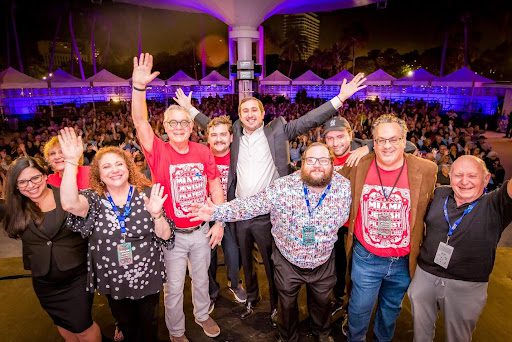|
Getting your Trinity Audio player ready...
|
The Miami Jewish Film Festival (MJFF) concluded its 27th edition with resounding success, solidifying its status as the largest Jewish film festival in the world. Combining in-theater and virtual experiences, the 2024 Miami Jewish Film Festival attracted audiences from all 50 states, boasting an estimated total attendance and unique views surpassing 47,500, setting a new benchmark.
The Festival also proudly announces this year’s Jury and Audience prize winners across eight major categories. The Critics Jury Prize, awarded by members of the Florida Film Critics Circle and South Florida journalists, went to Marco Bellocchio’s Kidnapped. The Next Wave Jury Prize, selected by a jury of 21 to 35 year olds, honored Leslie Shampaine & Pip Gilmour’s Call Me Dancer. The inaugural Kadima Jury Prize recognized Finn Taylor’s Avenue of the Giants, and the Torchbearer Award celebrated Rebecca Snow’s The Boy in the Woods. Audience Awards were bestowed upon James Hawes’ One Life for Best Narrative Film, Heather Dune Macadam’s 999: The Forgotten Girls for Best Documentary, Ayelet Menahami’s Seven Blessings for Best Israeli Film, and Ruth Liliana Levin’s animated film What’s In A Name? for Best Short Film.
The Festival kicked off with the premiere of Anthony Hopkins-starrer One Life, a vivid historical drama, at The Miami Beach Bandshell open-air amphitheater, drawing 750 attendees. The festival showcased 121 films (94 features and 27 shorts) from 25 countries, making it the largest film program among Jewish festivals this year. Over 80 virtual screenings were accessible nationwide, with enthusiastic responses from audiences across all 50 states, Washington D.C., Puerto Rico, and the U.S. Virgin Islands. Closing the Festival on a high note, Avi Nesher’s acclaimed Israeli film The Monkey House, which received 11 Israeli Academy Award nominations and is rumored to be his final work, captivated a record-setting audience of 850 moviegoers at the Miami Beach Bandshell.
Expanding its reach beyond virtual screens, the Festival hosted more than 80 movie nights in eight venues across Greater Miami, featuring 75 international filmmakers, special guests, and live performances. Notable attendees included Hollywood stars Stephen Lang and Elsie Fisher, Emmy-winning director Richard Shepard, producer Randy Schoenberg, and Israeli superstar Amit Ulman.
The Miami Jewish Film Festival also hosted more than 25 free virtual talks and live filmmaker Q&As available to audiences worldwide, which were viewed in more than 100 countries. Filmmakers, onscreen talent, and industry leaders connected with more than 3,000 attendees around the globe through MJFF’s virtual conversations. All virtual conversations are now available to watch for free on Miami Jewish Film Festival’s YouTube channel.
The festival saw a significant increase in attendance by historically marginalized communities and younger audiences, primarily attributed to a series of strategic initiatives launched or expanded this year. These initiatives include the “Next Wave” program, targeted to 21 to 35 year old college students and young professionals. Noteworthy features of this program were special presentations of Gene Wilder & Mel Brooks comedy classics Young Frankenstein and Blazing Saddles in celebration of their 50th anniversaries, as well as an after hours showing of the genre thriller Don’t Breathe with star Stephen Lang in attendance.
In collaboration with the LGBTQ Jewish organization Keshet, the festival expanded its “Focus on LGBTQ Cinema” program, catering to diverse audiences. Another highlight was the “Building Bridges/Breaking Barriers” program, a Black Jewish alliance initiative. This program featured the premiere of Rabbi on the Block, with director Brad Rothschild and film subject Tamar Manasseh in attendance, providing a unique and engaging experience at an event that was hosted in partnership with Temple Sinai and the Antioch Missionary Baptist Church. Moreover, the festival strengthened its “Accessibility+Inclusion” program, integrating Closed Captioning into all English language films featured in its virtual offerings. This effort aimed to ensure a more inclusive and accessible cinematic experience for all attendees.
“In a time when humanity and hope were most needed, we reconnected our community through the power of storytelling on the big screen and rediscovered through cinema the humanism that defines us. We have a profound sense of gratitude to all the artists who showed us that the art of filmmaking is brilliantly alive, as well as the dedicated staff, volunteers, and supporters who all came together in the shared belief that a world more connected through storytelling and a common humanity is a better world,” said Igor Shteyrenberg, Executive Director of the Miami Jewish Film Festival.
In total, the 2024 Film Festival program showcased 10 world premieres, 10 international premieres, 12 North American premieres, 7 US premieres, 4 East Coast premieres, 55 Southeast US premieres, and 11 Florida premieres, as well as over 50 conversations with filmmakers, stars, and scholars from around the world.
The 28th Edition of the Miami Jewish Film Festival will take place on January 9-23, 2025.






